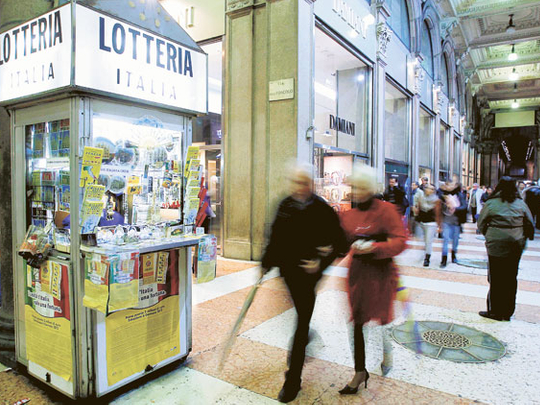
London: Uncertainty over who will lead Italy through the debt crisis once Premier Silvio Berlusconi resigns slammed European stocks and bonds on Wednesday, pushing Rome's borrowing rates to worrying new highs.
Tuesday's news that Berlusconi had finally bowed to pressure and would resign once new austerity measures are passed had helped markets in the US and Asia higher. Berlusconi had been perceived as part of the problem in the political deadlock gripping Italy.
That buying persisted for a while in Europe, but sentiment quickly soured again as traders worried about Italy's uncertain future. Italy's ten-year yield jumped above the seven per cent rate widely considered to be unsustainable in the long-run. When Greece, Ireland and Portugal saw their ten-year borrowing rates rise above seven per cent, the markets concluded they had to be bailed out.
Political deadlock
By late morning, the yield was trading at 7.35 per cent, up 0.77 of a percentage point from the previous day.
What happens in Italy is crucial to the Eurozone's survival. With debts of around €1.9 trillion (Dh9.5 trillion), Italy's debts are considered far too big for Europe to bail out.
Higher rates would make it more difficult and expensive for Italy to roll over its debts. The country has over €300 billion to raise in 2012 alone.
The worry appears to be that even without Berlusconi at the helm, Italy faces a period of political deadlock.
The next government will likely face the same pressures as Berlusconi — to enact quick reforms to shore up Italy's defences against Europe's raging debt crisis.
"The positive impact of Berlusconi's promised resignation is being diluted by a lack of clarity on where we go from there,' said Adam Cole, an analyst at RBC Capital Markets. "The possibilities range from a technocrat government — most market positive — to new elections — most negative."
In Europe, the main Milan stock index was down 4.2 per cent while Germany's DAX was down 1.8 per cent at 5,855 and the CAC-40 in France fell 1.9 per cent to 33,085. The FTSE 100 index of leading British shares was 1.2 per cent lower at 5,500.
The euro also fell sharply, trading 1.1 per cent lower at $1.3673.
Wall Street was poised for a retreat, too — Dow futures were down 1.3 per cent at 11,972 while the broader Standard & Poor's 500 futures fell 1.7 per cent to 1,252.












